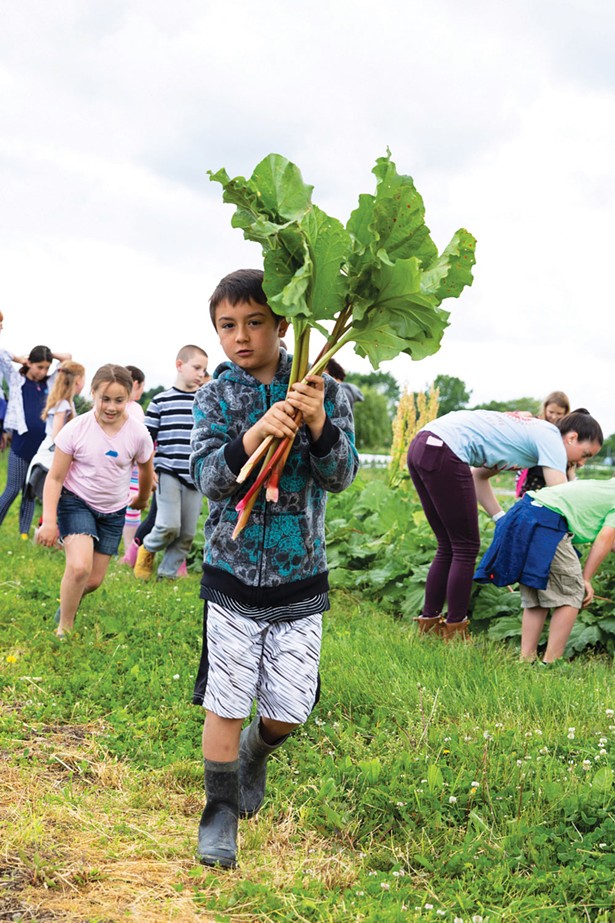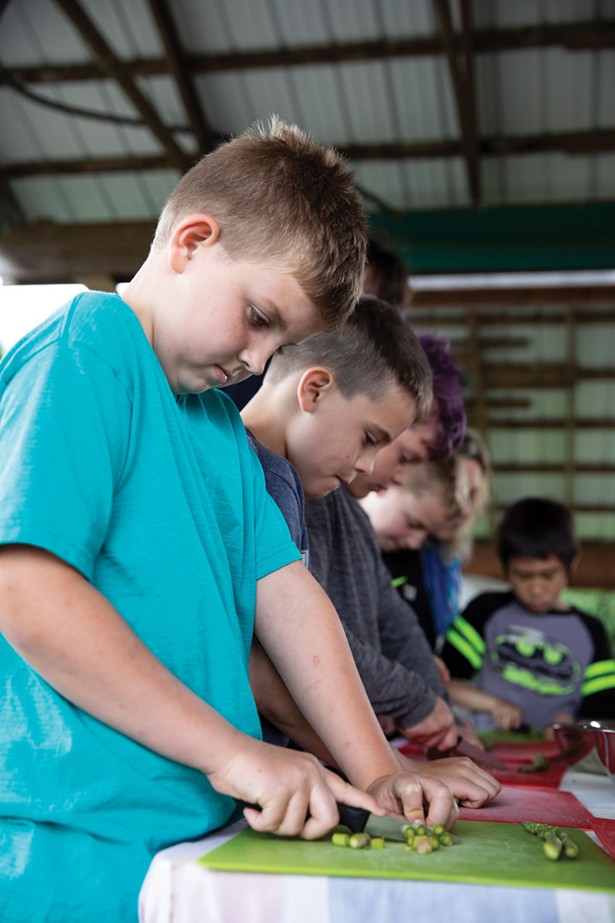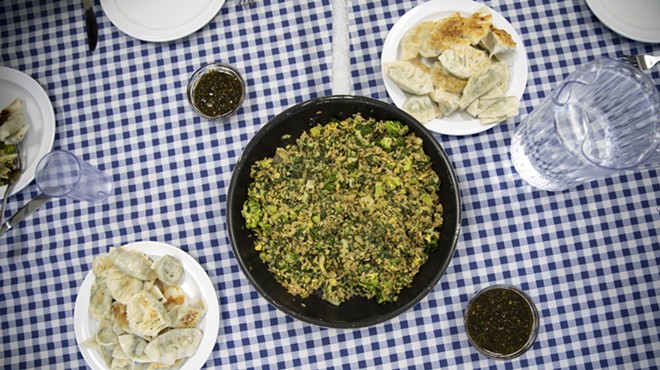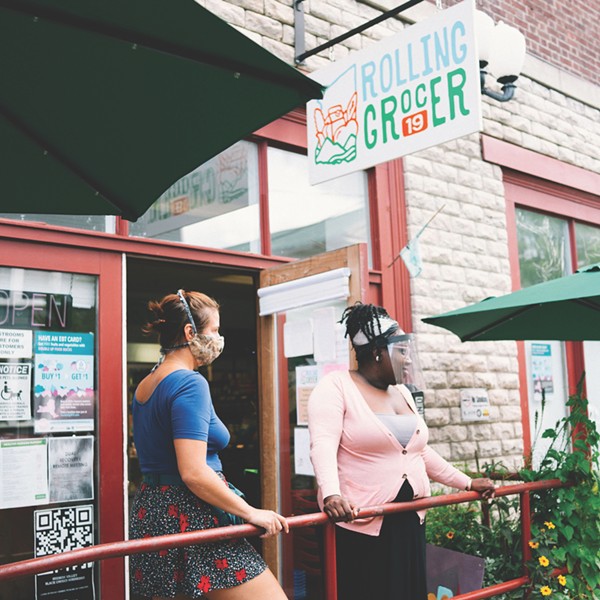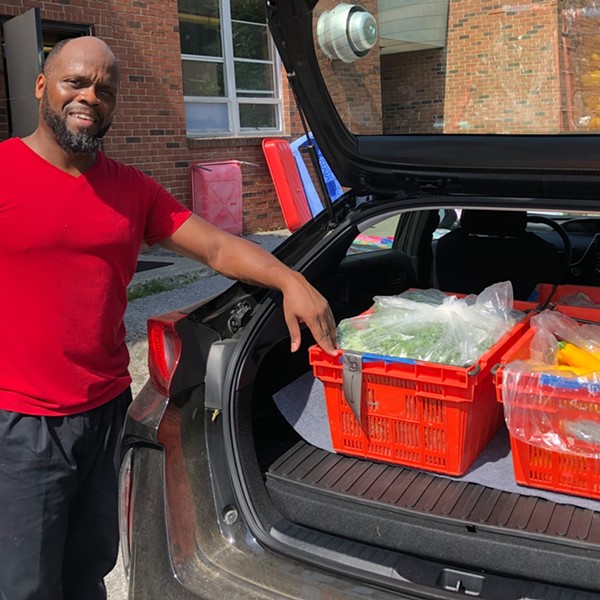The rolling farmland of Columbia County extends in all directions with fruit orchards and vegetable fields, dairy farms and livestock, and acre upon acre of golden grain. It's hardly the place you'd expect to find a food desert. Yet in towns like Hudson, the county seat, access to farm-fresh, nutrient-dense foods can be tantalizingly out of reach, especially for low-income populations that can't drive to grocery stores and farm stands. "The main drag of Warren Street doesn't have a lot of fresh, affordable food on it," says Jenn So, Hudson resident and director of programs at The Sylvia Center at Katchkie Farm. "In winter, you see people walking over a mile in the cold to ShopRite." A nationwide problem that we usually associate with dense urban hubs like New York City, food deserts can pop up in rural areas too, leading to a reliance on quick, unhealthy food choices from convenience stores and fast food joints.
The Sylvia Center—the nonprofit nutrition education and youth development organization where So works—is doing its best to change that. Founded in 2007 by Liz Neumark, CEO of Great Performances catering, The Sylvia Center took root in the fertile soil of 60-acre Katchkie Farm, an organic commercial farm in Kinderhook. While it started out as a place to grow farm-fresh food for Neumark's catering business, Katchkie Farm also carved out a space for The Sylvia Center's programs for kids and families, with the mission of growing a community of healthy eaters, cooks, and advocates for nutritious food. A second location in New York City lets The Sylvia Center reach urban communities as well with its youth-oriented cooking classes that teach practical skills for a healthy cooking and eating. Extending to all five boroughs, the program in New York City reaches around 1,800 students and families a year; in Columbia County, the program touches the lives of 1,500 each year.
The Sylvia Center runs a variety of programs for a wide demographic of participants—from farm visit experiences to in-school and after-school classes as well as programs for families—all with a focus on preparing and sharing fresh, healthy meals in a community setting. "Hopefully, over the time we're sharing that meal, we're talking about the types of foods we're eating at home and access to groceries and fresh products in the area," says Jennifer John, The Sylvia Center's executive director. "Maybe we're talking about ways to address the lack of access to fresh food and make the local food system more fair. We want to show folks that no matter what income level you have, you can make a choice with fresh foods that makes sense economically and also health-wise."
Lessons for Life, from Seed to Plate
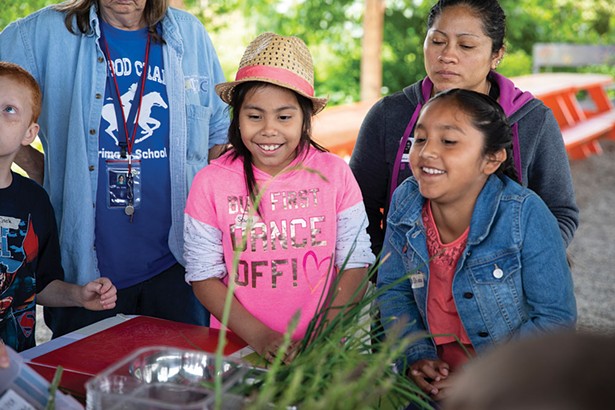
Until three or four years ago, The Sylvia Center offered one core program: a daylong, farm-based experience where groups of kids from New York City and surrounding areas would visit Katchkie Farm to learn about food from seed to plate, meeting the animals, working in the garden, harvesting vegetables, and ultimately cooking and eating a meal from scratch with chef instructors. The magic happens in a tactile, sensory experience of seeing where food grows, pulling it from the ground, and eating it on the spot, where it tastes fresh, earthy, and more alive than supermarket food. The Sylvia Center still offers the farm experience but in recent years has expanded its reach with programs for kids and teens in local elementary and high schools, and parent-and-child classes in community centers.
Working with schools offers the organization a larger scope for spreading the gospel of healthy eating. A five-year grant from the Berkshire Taconic Community Foundation has allowed The Sylvia Center to bring basic nutrition and cooking skills to classrooms in Germantown and Hudson; this fall they will expand to the Taconic Hills school district as well. Working with teachers, they have found ways to weave nutrition education into the curriculum for second-graders; in high school, after-school programs explore culinary skills with meal preparation and teamwork. Classes focus on a particular macronutrient like protein or carbohydrates, rounding it out with plentiful fruits and vegetables. Kids often say they can't wait to make the dishes at home with their families, or to bring their cooking skills to college.
It was her own college experience that opened So's eyes to the urgent need in America for a better handle on food. "My parents are immigrants from China, so I ate really good, homemade Cantonese food when I was growing up," she says. "When I went to college and saw the food in the dining halls I thought, 'What is this?' I didn't understand. A lot of my college friends didn't know how to cook, and I'd always been around people who knew how to cook from scratch. Knowing that was not most people's experience is what got me into the food education field. I wanted to help people learn how to cook for themselves and make something easy and tasty."
In recent classes, students have made dishes ranging from grain salads with farm-fresh snap peas, radishes, and homemade dressing, to green vegetable fried rice with edamame and strawberry-rhubarb tart. One favorite is vegetarian dumplings made from scratch. "A lot of the kids have eaten dumplings from Chinese takeout, but they've never had them this way," says So. "We use crumbled up tofu with vegetables and shiitake mushrooms, and this recipe always turns mushroom haters into mushroom lovers." Transforming picky eaters and opening kids' eyes to a world of produce choices is a big focus with the younger students, while gaining cooking skills can be transformative for the older ones. Each class comes with a CSA share from Field Goods featuring a bag of curated vegetables that students can take home once a week, so they can share their new skills and the farm-fresh bounty with their families.
Liberty, Justice, and Good Food for Everyone
Building a more equitable food system is a necessary task in this country, where the distribution of fresh, local, and organic foods almost always intersects with race and class—creating abundance in white, affluent communities and scarcity in communities of color and low-income demographics. "We know that one in six children is living with food insecurity in Columbia County," says John. "When it comes to food insecurity, it's a hidden problem. Nobody wants to come forward and say, 'Hey, I'm really worried about buying enough food for the week.'"
Because of the stigma attached to being food insecure, The Sylvia Center casts a wide net to the community instead of offering a needs-based program. "When we do our programs in places where people are living in poverty, we can draw folks in and do active recruitment, but we also know that having folks from all economic backgrounds in the same class together does more to promote these ideas for everyone. People don't have to be worried that they'll be singled out or seen as poor if they come to our programs. The concepts we teach are for everybody, but they go the farthest with families that are challenged about what to do with their family food dollars."
Breaking certain misperceptions about food is another key focus when it comes to planting the seeds for healthy eating. "There's a false idea that fruits and vegetables are more expensive than fast food," says John. "You can buy a burger for a dollar. You can buy a pound of zucchini for a dollar when it's in season, but you have to do more to prepare it to get it to the table. We're trying to get people to think more about what is healthy and good for their families. We all need to make these decisions every day, and we can choose vegetables and fruits for a variety of reasons, not just cost. Though you can actually take a pound of zucchini and make that into a couple of dishes."
Awareness about the connection between diet and health is often no match for the temptations of poor food choices and empty calories all around us. "The research is clear that eating plant-based meals is a healthier long-term choice, and incorporating more fruits and vegetables into your daily diet is a great way to stay healthy," says John.
Yet that knowledge is not really translating into a lot of changes when it comes to kids. Diet-related diseases like diabetes and obesity are on the rise in young people. "Eating fast foods and high-fat, high-salt meals all the time really has a detrimental, lifelong effect," adds John. "That's why we focus a lot on children, because we think the benefits of this can last a lifetime."
Teaching and Feeding the Whole Child
Woven into The Sylvia Center's programs, youth development is part and parcel to its mission. In the school and family classes, participants get a healthy dose of teamwork, collaboration, and confidence-building along with their micro and macronutrients. Some kids say their favorite part of the class is learning how to work with others in the kitchen, as they take a team approach to creating the meals.
Confidence grows quickly, even in a 40-minute class with kids. "When you give them real knives, such as paring knives to work with, it's an honor that's bestowed on them," says So. "A lot of parents won't let them use their knives at home. But once you teach them the proper way to use these tools, they rise to the occasion and you can see their confidence shine." In the last couple of classes, the kids get a chance to riff on the recipes and come up with their own dishes, rolling out their creativity and applying new skills to their personal tastes.
The New York City program takes youth development one step further by exploring vocational opportunities with teens; some go on to pursue careers in the culinary arts or local restaurants, or they get involved in the food justice movement. Upstate, the program hopes to bring the vocational angle into its programs in the future. Currently, the focus in the Hudson Valley is on expanding through school districts and training teachers to carry on the work they do. It takes a village, and a lot of breaking bread together, to get people eating healthy.
"I think teaching people how to cook is the best way to ensure that they'll have a healthy life, because those skills stay with you forever," says So. "It's a positive outlet: You're creating something when you're cooking. It's ultimately your personal choice to choose the food and make it into something nourishing for yourself and your family."
Does Green Vegetable Fried Rice and Crescent Dumplings sound delicious? Get the recipe from The Sylvia Center's Jenn So:








